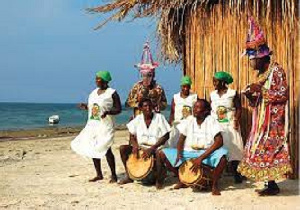The Garifuna people, descendants of Carib, Arawak and West Africa have always fought for their place, cultural identity and heritage since the 1800s against colonial rule and discrimination.
They fought to survive when the slave ship transporting them got wrecked at sea. When they settled at St. Vincent in the Caribbean, they faced persecution and were eventually driven away by the British forces, but, they prevailed. They even pushed forcefully to have their culture accepted at their present settlement in Belize.
The Garifuna people had to stand up for themselves in Belize because even though they were accepted in the country, they were discriminated against by the indigenous settlers.
The formal language of communication among the Garifuna, which comes from the Arawak and Carib, were banned in basic schools and their religious practices were frowned by the local churches.
Tenacity and resilience is the character of the Garifuna people. When the Catholics discriminated against them, they socialized some catholic faithful in their religion and it survived. When they were barred from joining indigenous cities in the Caribbean, they created their own communities. When the school system discriminated against them, they trained their own to be teachers, lawyers and doctors to superintend over the system and control policies governing it.
H Gilbert Swaso, former mayor of Dangriga, told the BBC the Garifuna have mastered the act of being receptive to harsh circumstances and turning it into their advantage to survive without sacrificing their culture.
It is reminiscent of their journey to Belize in 1832 where they travelled from St. Vincent in the Caribbean after they were drove away three times by the British government before finally settling in Belize.
In 1660, they were settled in the Caribbean Island of St. Vincent after a British peace treaty granted them stay. But, a decade on, the British government broke the agreement and reclaimed the Island, not until a military expedition that drove them away.
They suffered another revolt in Honduras in 1821 and they migrated once again until settling at Belize in 1832.
The former mayor said they requested to settle in Belize and were turned away three times. The Garifuna community rather grown on the fringes of the South and have now become a force to reckon with.
Oral tradition has it that the Garifuna people were involved in two ship wrecks in 1635 while on their way from the New World’s slave markets. That’s how they gained their freedom.
The enslaved who survived the storms of the oceans and swam to safety to the Caribbean island of St. Vincent were warmly received by the Carib and Arawak.
Each year, the Garifuna people commemorate this day by holding Garifuna Settlement Day on November 19.
They start the ceremony by re-enacting the boat landing, enjoy music, food and dance while making merry. It is a national holiday where unique cultural heritage is displayed.
Gilbert said the people Garifuna take pride in the history that they were never colonized or enslaved.
He said the national holiday is important because that is when they exhibit their food which is different from the rest of Belize. The uniqueness of the food lies in its simplicity and respect for nature.
According to him, the Garifuna food is organic and clean. He said Garifuna eat ingredients such as ripe and green plantains that are boiled and then beaten and then mixed together. They use coconut in making gravy which is spiced with basil, oregano and okra.
Source: face2faceafrica.com
 Home Of Ghana News Ghana News, Entertainment And More
Home Of Ghana News Ghana News, Entertainment And More





